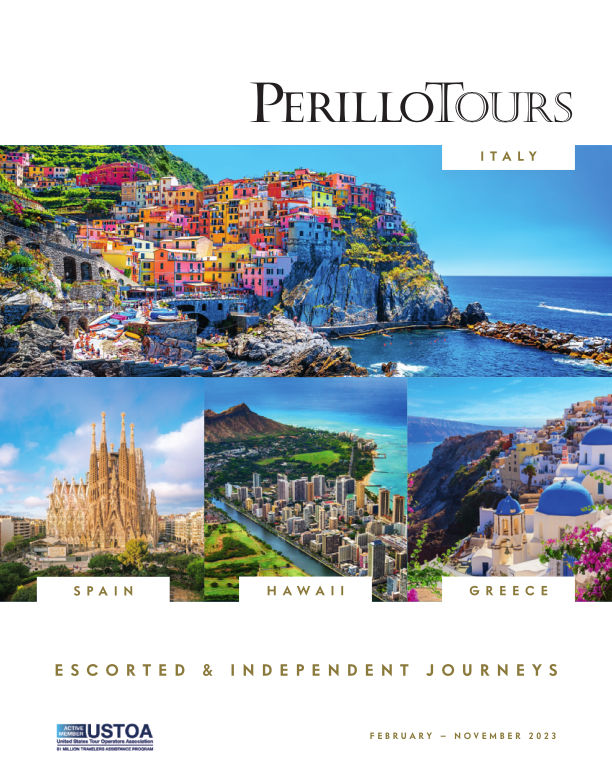If it is your first time to Italy, get ready for an incredible experience!
The prospect of visiting Italy, or any country, for the first time will provoke a wide range of emotions. For some, traveling to a foreign land-especially one that doesn't speak English - is so intimidating that any real enjoyment can only be realized with the help of a native to navigate through all the unfamiliar turf. For others, even those who don't speak Italian, the opportunity to be immersed in an entirely new culture is part of the fun, and they look forward to feeling their way through each of the novelties that Italy throws at them.
> Register today for our FREE Insider's Guide here!
> View Steve Perillo's helpful Italy Tips video series
Tipping
- Taxis: Government-regulated taxis are either white or yellow. Avoid taxis that are not metered and have no official signs. They are private cars that will charge you an expensive fee. Unlike in the U.S. where taxis are hailed on the street, in Italy they are found at taxi stands or are called by telephone. All charges are listed on a price chart displayed inside the cab. Extra charges are in effect at night, for luggage service and phone booking. A 10% tip is expected but not mandatory.
- Restaurant tipping: Both il servizio (service charge/tip) and il coperto (cover charge for bread and water) are usually included in il conto (the bill). By Italian law the gratuity is included in the bill so extra tipping isn't required. However, it is customary, especially if the service is good, to leave an additional gratuity between 5% and 10%.
- Hotel Tipping: Tipping in hotels is a customary practice. The service charge of 15% - 19% is already included in your bill. Other suggested tips include 50 euro cents per day to the chambermaid, 50 euro cents to the doorman for calling you a cab, and between 1 and 2 euros for the bellhop if he carries your bags to your room. The concierge expects about a 15% tip on his or her bill, as well as tips for any extra services. If you are staying at a 4- or 5-Star hotel these suggested amounts should be doubled.
Useful Knowledge:
- Shopping: Italian stores generally are open from 10 a.m. to 1 p.m. The siesta/pausa lunch break lasts until 3 p.m. Stores close for the day by 7:30 p.m. Stores in major cities do not usually take the siesta and stay open later (10 p.m.). Most stores are closed on Sunday.
- Café Culture: While enjoying an espresso at a table is always possible, the locals enjoy standing at the banco, or bar area.
- Hand Gestures and Loud Voices: Unlike in the U.S. of A., hand gestures and loud voices can be a way of expressing profound happiness.
Hotel Information:
- Hotels: There are more than 40,000 hotels in Italy, not counting Bed & Breakfasts and Agriturismos. When looking for a place to stay, remember that rates include taxes and service; the IVA (value-added tax, currently 10%) should be added to the total amount.
- Electrical: Not all hotel rooms provide hairdryers; if you bring your own, an adapter/transformer is a necessity. This will also be important for all other electrical devices, including laptop computers, because in Italy the voltage is different (220). Also, outlets have two round-pronged plugs, which is another reason an adapter plug is necessary.
City Information:
- Capital: Rome (population: 2,553,873).
- Major Cities:
- Milan (population: 1,308,311)
- Turin (population: 902,255)
- Genoa (population: 611,476)
- Venice (population: 271,251)
- Florence (population: 366, 488)
- Naples (population: 1,000,470)
- Palermo (population: 675,501)
Just the Basics:
- Italy's Time Zone: one hour ahead of Greenwich Mean Time (GMT+1). Italy is generally six hours ahead of Eastern Standard Time in the United States, aside from the rare instances affected by the Spring Forward/Fall Back clock-changing discrepancy when the difference is five hours.
- Country Code (for international calls to Italy): +39.
- Currency: Euro. Available in bills of 5, 10, 20, 50, 100, 200, and 500 euros; coins of 1 and 2 euros and 1, 2, 5, 20, and 50 euro cents.
- Official Language: Italian. German is spoken in the northeastern regions of Trentino-Alto Adige. There are small French-speaking pockets in the Valle d'Aosta region to the northwest and a Slovene-speaking minority in the area surrounding Trieste to the northeast.
- Area: 301,323 square km (116,303 square miles).
- Population: 58,147,733 (2007).
- Festa della Repubblica: Italian National Holiday - June 2nd.
- Flag: The Italian tricolor is green, white, and red, in three vertical bands, equal in dimension.
- Nickname: Italy is known as il bel paese (Italian for beautiful country) due to its picturesque and varied landscape and its artistic patrimony. Italy is home to the greatest number of UNESCO World Heritage Sites (40 as of January 1, 2006).
- Religion: Roman Catholic is the main faith - 85% of native-born citizens are nominally Catholic. There are substantial Protestant, Jewish, and Muslim communities.
- Education: Italy has statewide education system, with a five-year primary stage and an eight-year secondary stage.
- Exports: $336.4 billion: engineering products, textiles and clothing, production machinery, motor vehicles, transport equipment, chemicals, food, beverages, tobacco, minerals, and nonferrous metals.
- Imports: $329.3 billion: engineering products, chemicals, transport equipment, energy products, minerals, nonferrous metals, textiles and clothing, food, beverages, and tobacco.

